The Doberman Pinscher
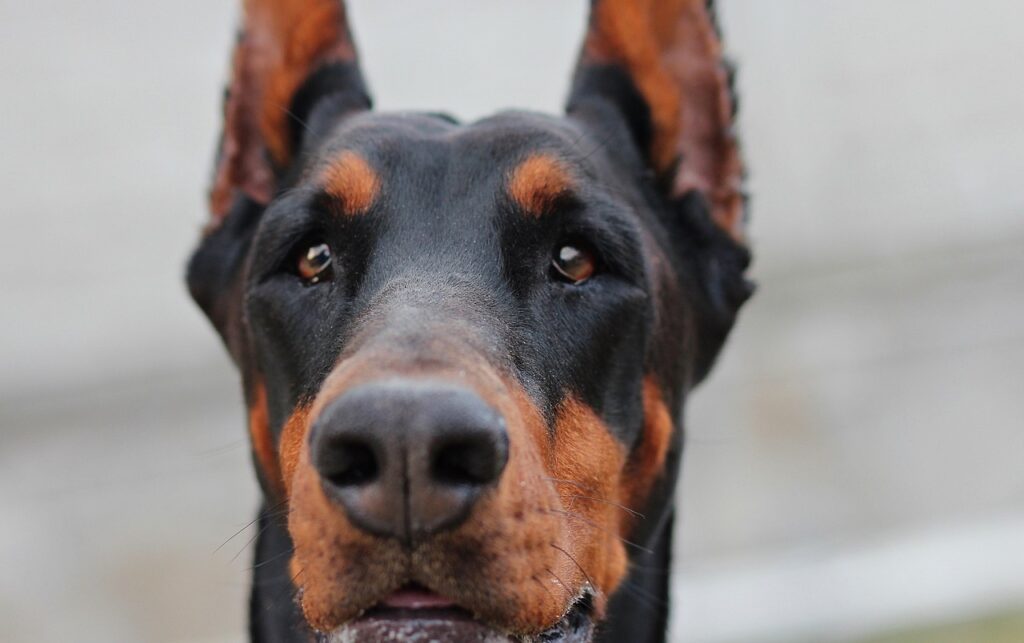

This month, for our first “Dog Of The Month” series of blog posts, we have chosen the Doberman Pinscher, a beautiful and highly intelligent dog that we are sure you will love to read about.
Jump To Any Section You Would Like To Read
A Brief Introduction
The Doberman Pinscher is a medium to large sized domestic dog. Alert, fearless, athletic… These are the most common adjectives used to describe them. In the past, they were often used as guard dogs or police dogs, due to their capacity to be trained to do many things. This has probably given them somewhat a negative image, but the truth is, they are actually very friendly and loyal dogs who will love their family more than anything. If you want to know more about them, their origin, their personality, their health, or how to take care of them, just carry on reading!
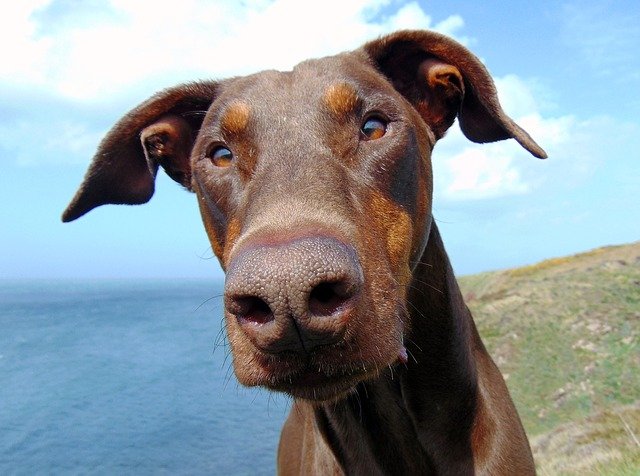

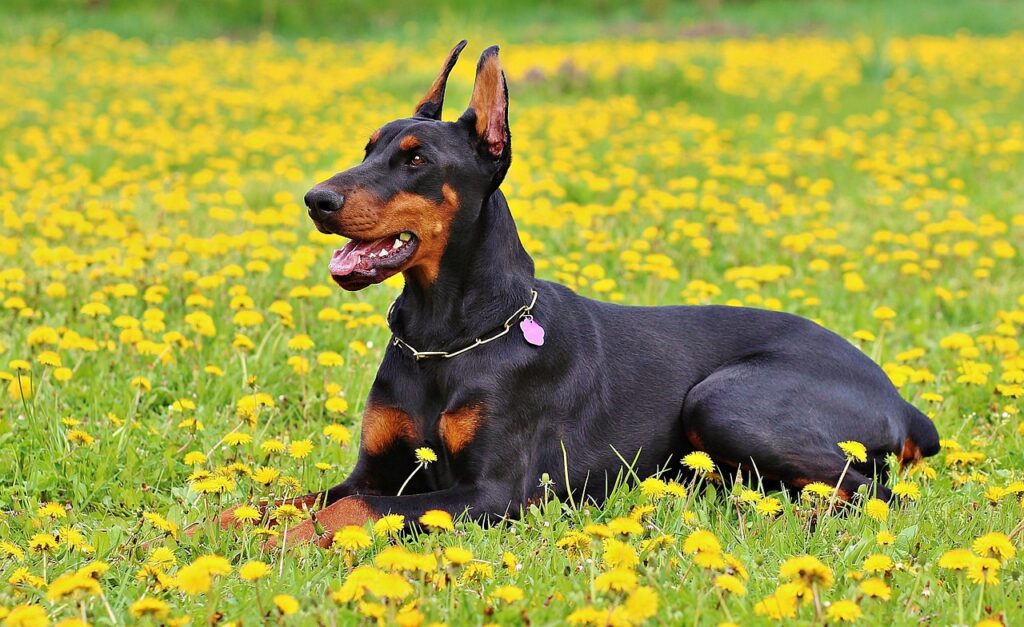

Where Does The Doberman Pinscher Come From?
The Doberman is a mixture of many different dog breeds which includes the Rottweiler, the Beauceron, the German Pinscher, the German Shepherd, and some even say the Greyhound. It is hard to know exactly all the breeds that were used to create the Doberman breed. What we know is that the Doberman was first bred in Germany, around 1890, by a man named Karl Friedrich Louis Doberman who at the time was a tax collector who also ran a dog shelter. As he would run a dog shelter, he had access to many different breeds, and so he decided to breed the perfect dog in his eyes: an extremely strong and intelligent dog that could protect him against anything. A second person was involved in the process of breeding and perfecting the Doberman. After Karl Friedrich Louis Doberman passed, Otto Goeller, another breeder, founded the National Doberman Pinscher Club and then perfected the breed even more.
What Are The Physical Characteristics Of The Doberman Pinscher?
The Doberman Pinscher is a medium to large athletic, robust and sleek dog. They are very muscular and powerful, and are very elegant looking. The female Doberman usually weighs between 32 to 35 kilograms and measures between 68 and 72 centimetres. The male Doberman usually weighs between 40 to 45 kilograms and measures between 68 to 72 centimetres. Their body is often referred to as squared and very lean, as they have hardly any fat and are mostly made of muscles. Their hair is usually short, smooth and thick. Their hair colour is black or dark brown with fawn markings above each eye, on the muzzle, on the throat, on the chest, as well as on the legs and below their tail. Their eyes are usually dark coloured.
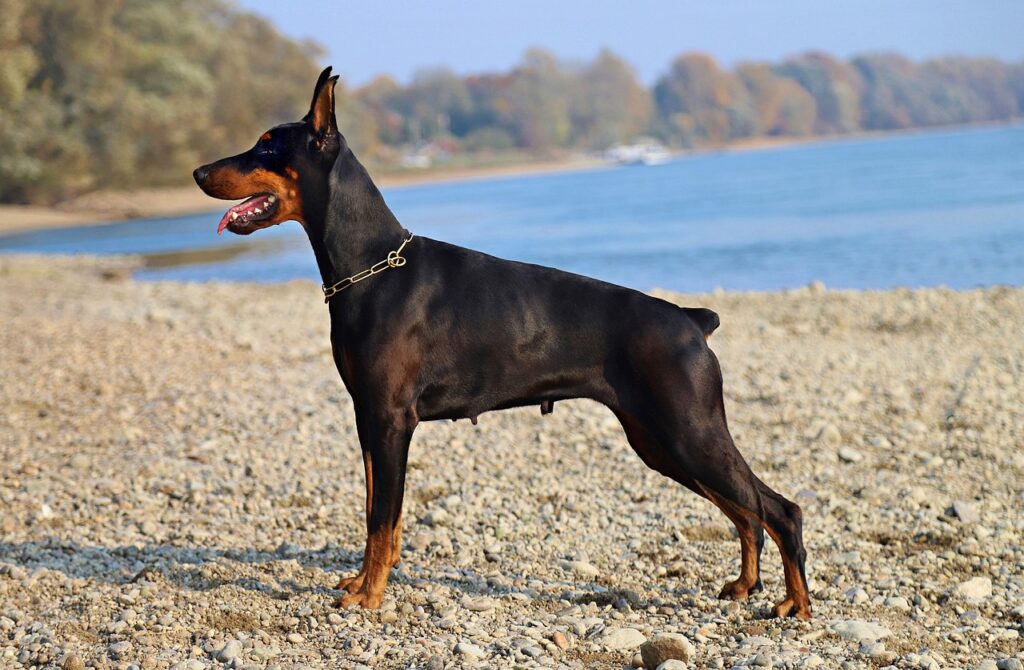

What Is Their Personality Like?
It is safe to say that the Doberman Pinscher has quite a complex personality. They have suffered from a bad reputation for most of their existence due to their history as well as the fact that if not well trained, they can be difficult to handle. But even if the Doberman can be quite a handful without proper training, it does not make them a violent dog. They are in fact the opposite of violent.
The Doberman Pinscher is a very friendly dog who will love you and your family more than anything. They are very dependent on their family and hate to be without them. In fact, they would rather follow you everywhere if they could. They are loyal and tend to create a strong bond with one member of the family, but will love everyone unconditionally and will get very protective over the people they care for. In fact, they are fearless and would risk their life without a doubt just to protect someone they love. They are peaceful and are children friendly.
Although they are sweet, it is important to make them socialise with as many people as you can from a young age, as they can be quite suspicious of strangers. From as early as possible, you should make them meet as many new people as you can, bring them around children, make them socialise with other dogs and other animals. It is very important to do so, so they don’t become stressed around people and other animals when they get older.
The Doberman Pinscher has a strong personality and so will need an owner that has one too. It is very important to train them from a young age. They are actually quite easy to train as they are very obedient and intelligent. They are so smart, they actually love to learn, and need it. They enjoy being mentally challenged on a daily basis, so if you would like to teach all kinds of tricks to your dog, they are the perfect breed for you. They can be very sensitive so it is important to always use positive reinforcement with them and not punishment. Avoid violence at all costs or you will lose their trust.
On top of needing to be mentally challenged on a daily basis, they also need physical activity on a daily basis. In fact, a few hours a day. They are very active, so they require a lot of exercise. They can adapt to living in an apartment but will be required to be taken out as much as possible. It is better for them to live in a house with a large fenced and secured garden as they love to run, exercise and explore.
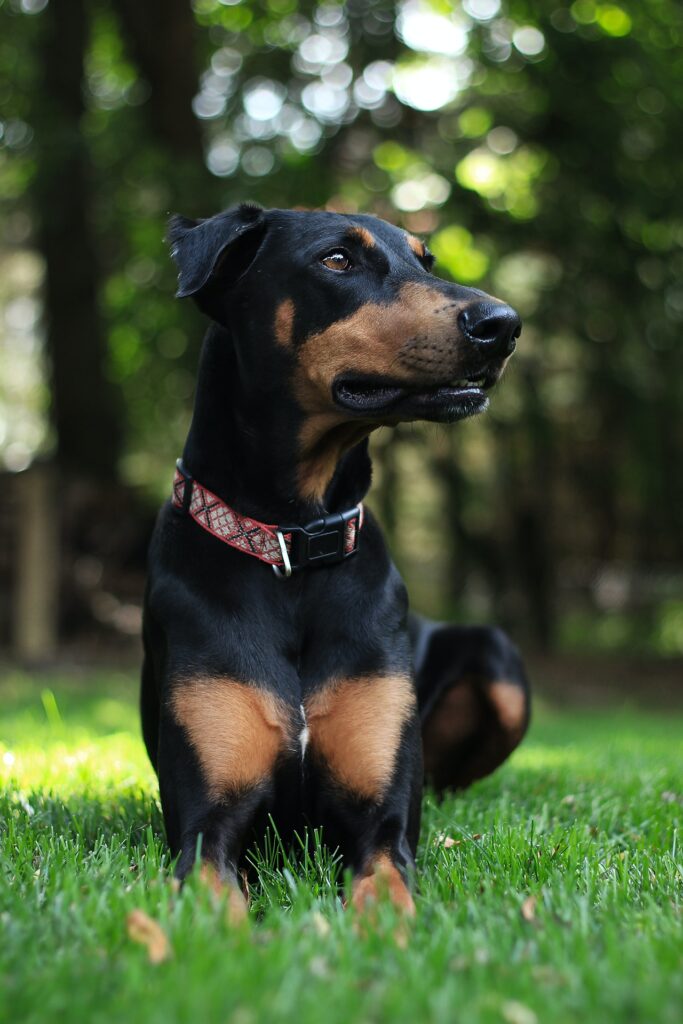

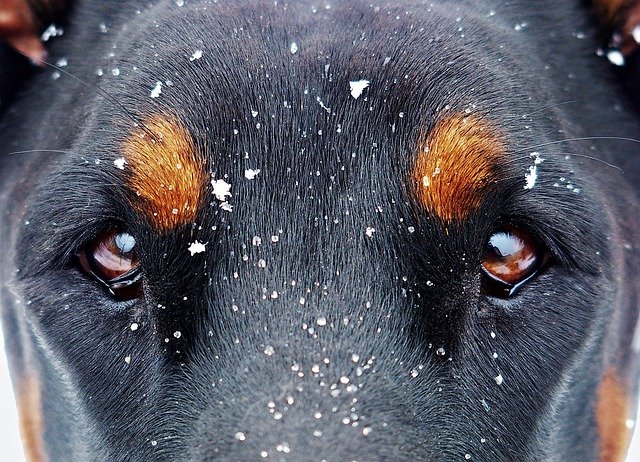

How To Take Proper Care Of The Doberman Pinscher?
Nutrition:
Dogs are canines and descendants of wolves. Most people believe that this makes them carnivores, but dogs, just like wolves, are in fact omnivores that require both meat and plants in their diet.
A dog’s stomach in general is not designed to digest carbohydrates. Carbohydrates are a type of nutrient found in certain foods. While dogs should not be eating too many carbs, they are fine in small quantities. They are actually often found in dog dry food. It is important that your dog is fed a balanced diet. We recommend you should speak to your veterinarian if you have any questions or concerns for your dog’s diet.
Puppies and dogs under 1 years old usually require a special diet designed just for them so they can grow healthy and strong. Again, always ask your veterinarian what are the best options for your puppy if you have any doubt.
The main foods to avoid when feeding your dog are:
- Any food that contains Xylitol, which is an artificial sweetener that can cause liver failure, brain damage or seizures in your dog.
- Chocolate, coffee and caffeine in general as they contain methylxanthines which are very harmful for your dog.
- Avocados are to avoid as they are very poisonous to dogs. They contain Persin which can cause severe vomiting and diarrhoea.
- Onion, garlic and chives in all shapes. They are very irritating to a dog’s digestive system.
- Citrus are to be avoided as they usually contain a high amount of citric acid which can be very irritating for your dog’s bowels.
- Grapes and raisins, which can be very toxic for your four-legged friend and cause them to have kidney failure.
- Any food that contains a lot of salt, as it can cause uncontrollable thirst as well as sodium ion poisoning.
- Nuts are to be avoided, as they contain too much fats and oils. Macadamia nuts in particular should be avoided as they contain a toxin that can affect the muscles and the nervous system of your dog.
- Alcohol should never be given to your dog as it can cause extreme liver and brain damage. Even the smallest amount can be devastating for your pet.
You can choose to put your Doberman Pinscher on a raw diet or on a dry food diet for more convenience. Both have pros and cons and again, we recommend you talk about this with your veterinarian to find what’s best for you and your dog. You can find dry dog food specially built for the needs of the Doberman Pinscher, from many different brands. It is important to remember that all dogs are different and can have different conditions. One food that might be fine for one dog might not be fine for another.
How often to feed my dog?
Puppies should be fed 3 to 4 times a day. But this can vary depending on how much calories your dog burns a day. Puppy Dobermans tend to be very active and might need to be fed 4 to 5 times a day.
Adult dogs should be fed 1 to 2 times a day depending on their energy level and their size. Certain brands of dry dog food will give a guide at the back of the bag, but you might need to adjust the amount as all dogs are different and some burn more energy than others and therefore need to eat more than others. We recommend you talk to your veterinarian to figure out the perfect amount to feed your dog on a daily basis. Use a measuring cup or a jug to make sure you always give them the right amount of food.
It is important for dogs to have scheduled meals. Choose the right time for them to eat each meal, and keep the same pattern each day. Do not feed them just before exercise. All dogs can suffer from bloating if exercising after eating, but the Doberman Pinscher is particularly sensitive to this.
When it comes to treats, we recommend you to use as much as possible healthy treats such as carrots, bananas or green beans. You can also ask your veterinarian or your local pet shop to recommend you the best dog treats adapted for your dog.
Grooming:
The Doberman Pinscher does not require excessive grooming as they have rather short hair. They require to be brushed once a week as they tend to shed quite frequently. You should get their nails trimmed monthly and brush their teeth at least two to three times a week to avoid plaque buildup on their teeth or dental problems. We recommend you gently and carefully wipe out their ears at least once a week, but do not insert anything inside their ears. Wash or bath them once every two months.
If you notice that your dog does not smell nice although you take good care of them, talk about it to your veterinarian. Bad smell in dogs does not necessarily mean that the dog is not clean. It can be caused by health issues such as dental problems, skin inflammation caused by allergies, gas, ear infections, or even an issue with their anal sacs.
Physical Activity:
The Doberman Pinscher is an extremely active dog that requires a lot of physical activity as well as mental stimulation. They require a minimum of three daily walks, as well as physical and mental stimulation exercises every single day. If you are the kind of person or family who spends a lot of time outside, going on walks, hikes, treks, your Doberman will be the ideal companion to join you. They love to be part of the physical activities of their families.
Training:
It is very important to socialise the Doberman Pinscher from a young age as they naturally are very alert and suspicious of people. You should get them used to other people, other dogs, animals and children of all ages as soon as possible so they feel comfortable around anyone when they get older.
The Doberman Pinscher requires basic training and obedience training. They are very obedient and intelligent. You should use these qualities and train them so they obey and listen to you at all times. Training can be done by you if you feel confident enough and are committed. We recommend you learn the basics of dog training before acquiring a Doberman, as they need someone who has a strong personality and knows how to manage them. The training can be done by a professional but we recommend you still learn the basics so your dog always knows that you are the one in charge, and they are not.
It is important that your dog listens to you and most importantly, trusts you. We recommend to always use positive reinforcement processes. Punishment should be avoided at all costs with the Doberman Pinscher as they are extremely sensitive. They will not trust you if they fear you.
Making Them Feel Comfortable In Your Home:
We all love to feel comfortable in our home, and when you get a dog, your home also becomes their home.
The Doberman loves to be close to their family. They also are very sensitive to cold weather and should not be left to sleep outside. We recommend you make a cosy space for them in your house, with a warm and big enough bed, and covers available during winter. You will soon realise that your dog’s favourite spot is either in the sun or close to the fire.
When choosing the spot where they will sleep, we recommend you choose a place that is quite peaceful, where they will not be bothered by people walking by. Sleep is very important for the Doberman Pinscher as they burn a lot of energy during the day and so need all the peace in the world to have a good night of sleep. They are very cuddly and needy dogs who love to be around their family, so do not isolate them in a corner where they can not see anyone.
Just like every dog, they also need a quiet spot for their food and drinking bowls to be in peace when eating. We recommend to always use stainless steel bowls as they are more hygienic than plastic bowls and more resistant than ceramic bowls. Elevated bowls can be good for larger dogs so they don’t have to lean too much to eat or drink. If your dog eats too fast and it is a problem, we recommend slow feed bowls.
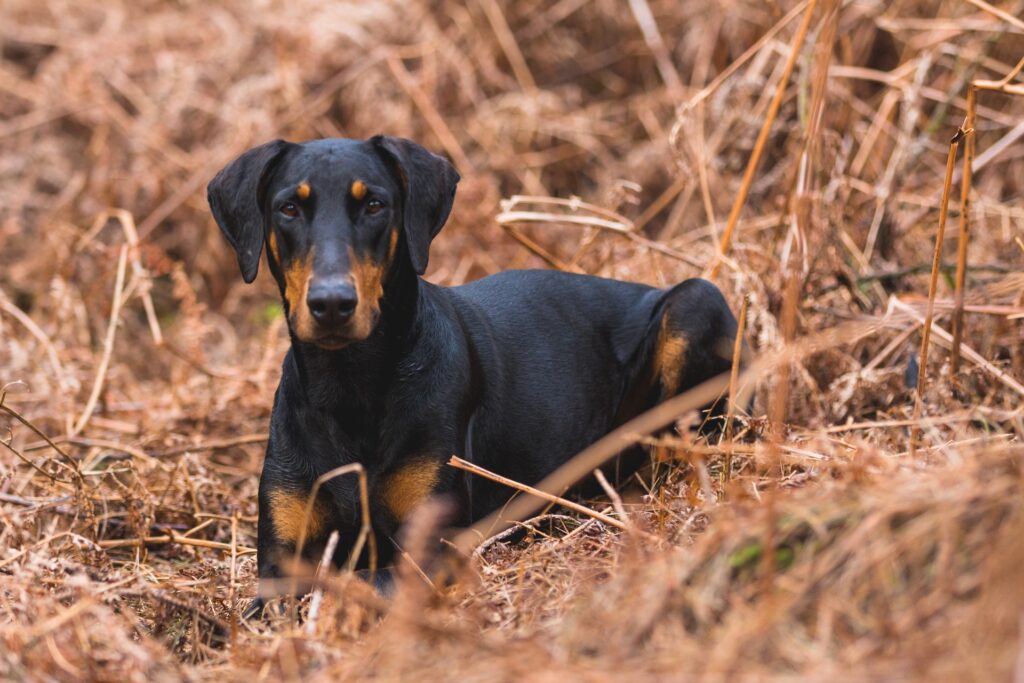

What are the most recurrent health conditions in the Doberman Pinscher?
The Doberman Pinscher is a generally healthy dog. But just like other breeds, there are several health conditions that are more common in the Doberman Pinscher as they are usually genetically inherited.
The most common diseases in Dobermans are the following:
- Von Willebrand disease: The Von Willebrand disease is the most common genetically inherited disease in Dobermans. It is a bleeding disorder that is caused by a deficiency in the amount of a specific protein that is needed to help the platelets stick together and form clots to seal broken blood vessels.
- Hip Dysplasia: similar to arthritis and osteochondrosis, hip dysplasia affects the joints of the dog. The dog suffers from pain and stiffness of the joints which causes difficulties in moving. This can severely impact the quality of the dog’s life.
- Dilated Cardiomyopathy: according to purinaproclub.com, dilated cardiomyopathy is a serious, “inherited, irreversible heart muscle disorder” that can “cause ventricular arrhythmia, or erratic heartbeats, and sudden death.”
- Hypothyroidism and autoimmune thyroiditis: autoimmune thyroiditis occurs when the immune system of the dog attacks the thyroid gland. Hypothyroidism occurs when having low levels of thyroid hormone.
We recommend you visit your veterinarian every 6 months for a full check-up, even if your dog is perfectly healthy. Always follow their vaccine schedule, as well as external and internal worming. You should also consider getting your dog neutered, as it can have great benefits for your dog, such as reducing the risk of cancer, uterine infections, prostate disease, and many more.
If you notice any change in our dog’s behaviour like an excessive sleep, a loss of appetite, diarrhoea, frequent vomiting, difficulty in breathing, limping, or anything that appears abnormal to you, we recommend you visit your veterinarian as soon as possible.
The life expectancy of the Doberman Pinscher varies from 10 to 14 years.
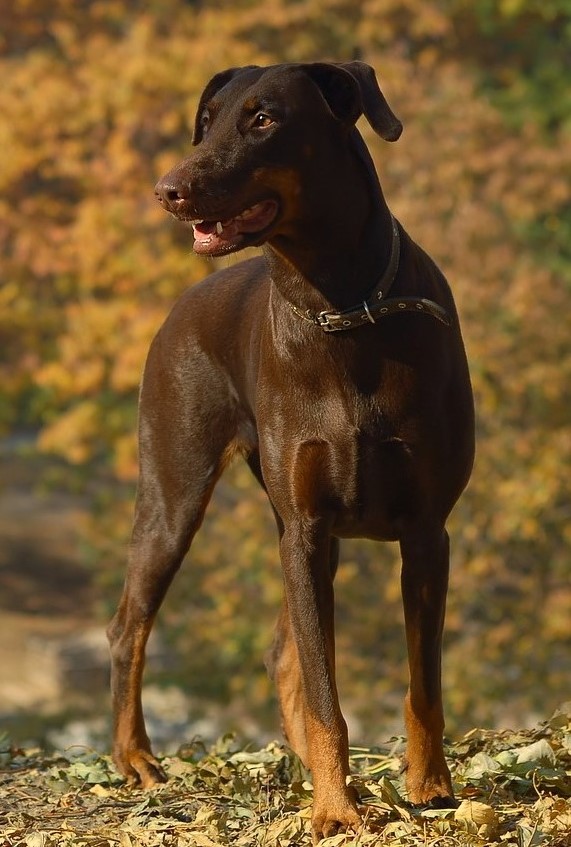

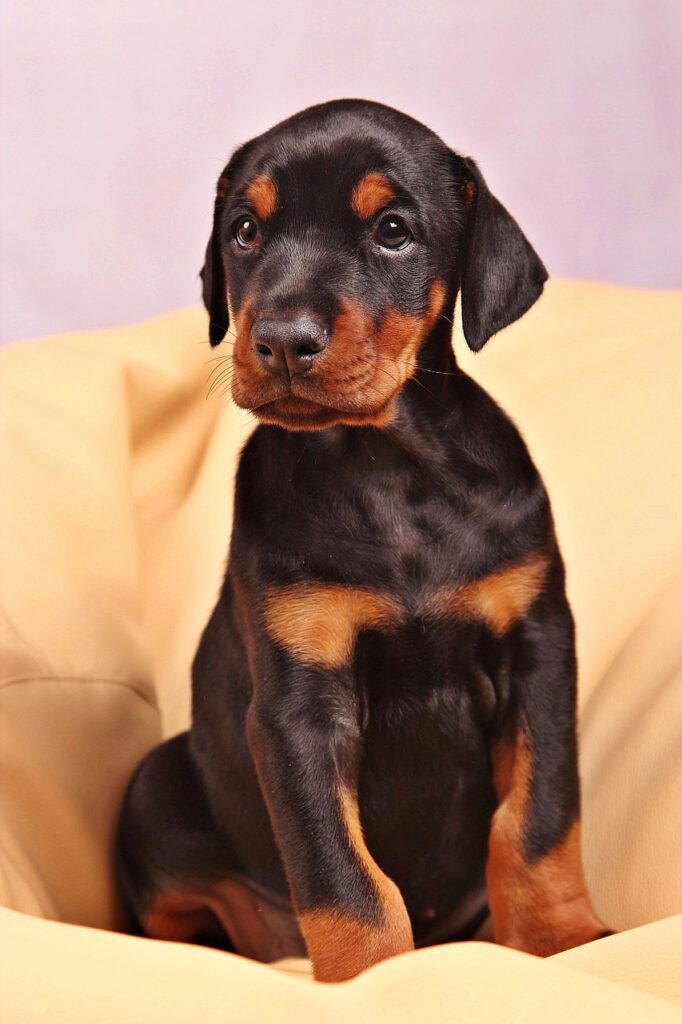

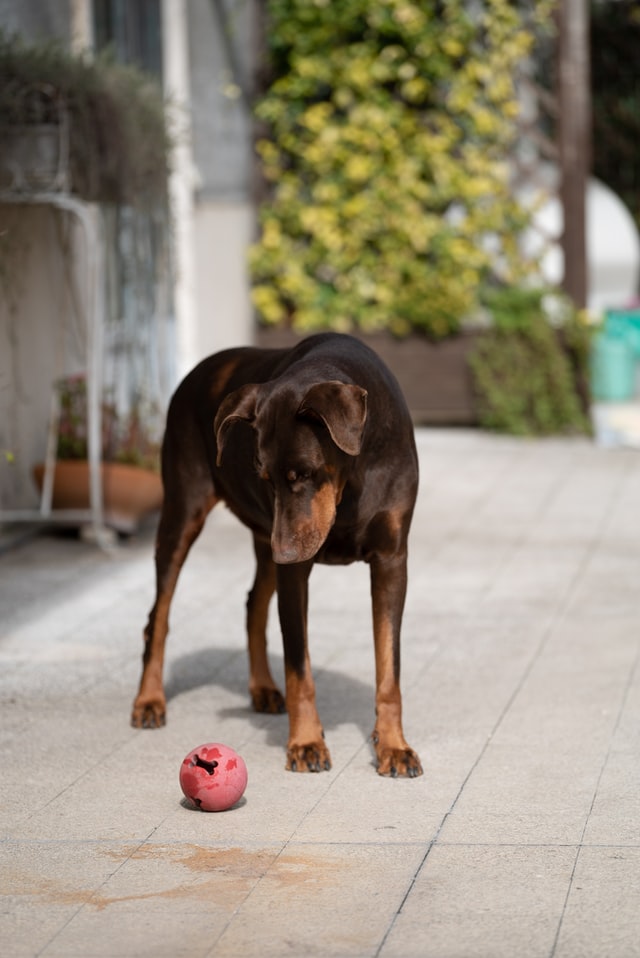

To sum it all up, the Doberman Pinscher is an amazingly intelligent and loving dog that will require a lot of your attention and time. This dog is for people who are willing to spend a great amount of time with their dog. The Doberman is full of energy and so requires a lot of exercise and needs to be mentally challenged on a daily basis. They can adapt to apartment life but need to spend a great deal of time outside. They are obedient when well trained, and tend to be very close to their family. If you have a strong personality and are committed to give a lot of your time to your dog, there is no reason the Doberman Pinscher would not be the right dog for you.
